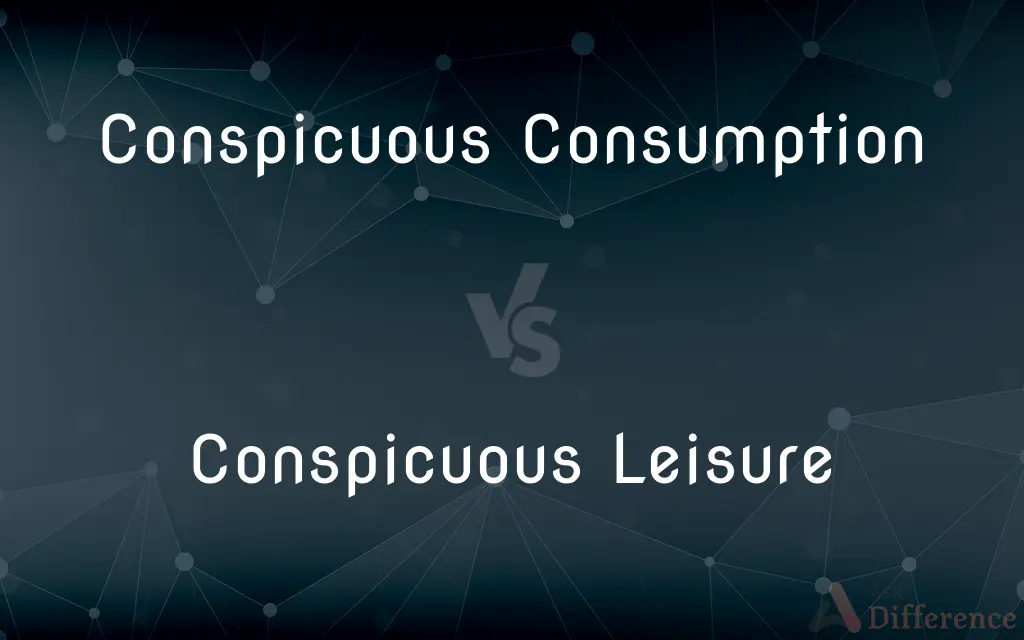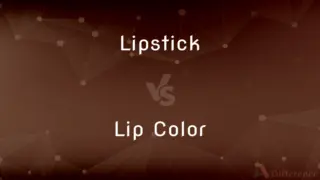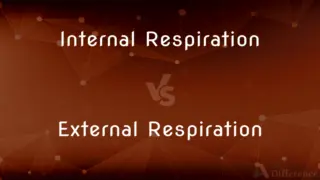Conspicuous Consumption vs. Conspicuous Leisure — What's the Difference?
Edited by Tayyaba Rehman — By Fiza Rafique — Published on December 30, 2023
Conspicuous Consumption refers to the buying of goods to flaunt wealth or social status, while Conspicuous Leisure indicates the display of leisure time as a status symbol.

Difference Between Conspicuous Consumption and Conspicuous Leisure
Table of Contents
ADVERTISEMENT
Key Differences
Conspicuous Consumption and Conspicuous Leisure are both terms that delve into the social and economic behaviors of individuals, particularly in how they showcase their status or wealth. Conspicuous Consumption is rooted in the act of purchasing and using goods or services primarily to flaunt one's affluence. It isn't about the utility or inherent value of the item, but rather the statement it makes about the purchaser's economic status. Conspicuous Leisure, conversely, doesn't revolve around tangible goods but emphasizes the display of leisure time as a symbol of social prestige.
Drawing from Thorstein Veblen's theories, Conspicuous Consumption underscores the societal impact of consumerism, where people often buy luxury items not out of need but to assert their social standing. This practice can be seen in the purchase of high-end cars, designer clothes, or expansive houses. On the other hand, Conspicuous Leisure emerges from the idea that having ample leisure time – and visibly enjoying it – signifies one's elevation above the daily grind of work. In a society where many toil endlessly, the ability to spend time idly becomes a mark of elevated status.
Another way to look at Conspicuous Consumption is to see it as an external expression of wealth. The brands one wears, the car one drives, or the gadgets one uses are all public declarations of one's economic position. Conspicuous Leisure, however, is more about showcasing the luxury of time. It's the long vacations, the mid-week golf games, or the regular spa days that broadcast one's freedom from the typical work constraints.
Both Conspicuous Consumption and Conspicuous Leisure offer insights into societal values, especially in a capitalist framework. While Conspicuous Consumption highlights materialism and the power of branding, Conspicuous Leisure underlines the value placed on time and the nuances of work-life balance.
Comparison Chart
Nature
Materialistic
Time-related
ADVERTISEMENT
Showcase of
Wealth through tangible goods
Status through leisure activities
Rooted In
Consumerism
Ability to enjoy leisure time
Examples
Luxury cars, designer clothes
Long vacations, frequent spa days
Societal Implication
Emphasis on branding and material affluence
Value on time and freedom from work constraints
Compare with Definitions
Conspicuous Consumption
The act of purchasing luxury items to flaunt social status.
Driving a luxury sports car primarily to impress others is a form of Conspicuous Consumption.
Conspicuous Leisure
Displaying prestige by emphasizing leisure over labor.
Often being seen at high-society daytime events while peers work showcases Conspicuous Leisure.
Conspicuous Consumption
Acquiring goods more for public display than utility.
Buying the latest designer handbag, even if unnecessary, is driven by Conspicuous Consumption.
Conspicuous Leisure
Flaunting affluence by engaging in non-productive activities.
Regularly attending exclusive golf resorts and spa retreats is a testament to Conspicuous Leisure.
Conspicuous Consumption
Consumption patterns driven by a desire for social prestige.
Wearing branded clothes not for comfort but for the brand's image resonates with Conspicuous Consumption.
Conspicuous Leisure
Demonstrating social status through visible, prolonged leisure activities.
Taking a three-month-long European vacation to display one's luxury of time is Conspicuous Leisure.
Conspicuous Consumption
Expenditure on luxury goods to gain social recognition.
Buying a mansion in a prestigious neighborhood, mainly to boast one's affluence, epitomizes Conspicuous Consumption.
Conspicuous Leisure
Engaging in activities that signal the absence of work-related pressures.
Spending weekdays at exclusive social clubs, hinting at a lack of work obligations, reflects Conspicuous Leisure.
Conspicuous Consumption
The purchase of items to signal wealth and position.
Hosting extravagant parties with the main goal of showing off is an exercise in Conspicuous Consumption.
Conspicuous Leisure
Showcasing wealth and status through the luxury of time.
Frequently posting pictures from exotic getaways is a nod to Conspicuous Leisure.
Common Curiosities
What drives Conspicuous Consumption?
It's primarily driven by the desire to showcase wealth and achieve social recognition through material possessions.
How does Conspicuous Leisure differ?
Conspicuous Leisure revolves around flaunting social status through visible leisure time, implying affluence in time.
Is Conspicuous Consumption only about luxury goods?
Primarily, but it's more about the intention behind the purchase — to flaunt wealth and status — than the item's intrinsic value.
Can someone engage in both?
Absolutely, many affluent individuals both buy luxury goods (Conspicuous Consumption) and indulge in leisurely activities (Conspicuous Leisure).
Does Conspicuous Consumption always imply wealth?
Not always. Some might engage in it due to societal pressures, even if it strains their finances.
Are vacations a form of Conspicuous Leisure?
Extended, lavish vacations, especially when showcased, can be considered a form of Conspicuous Leisure.
Does Conspicuous Leisure mean someone is unemployed?
Not necessarily. It signifies that someone has the luxury of time, perhaps due to wealth or a particular lifestyle.
Why do people engage in Conspicuous Consumption?
Reasons can range from personal satisfaction to societal pressures, but the underlying motive is often social recognition.
Share Your Discovery

Previous Comparison
Lipstick vs. Lip Color
Next Comparison
Internal Respiration vs. External RespirationAuthor Spotlight
Written by
Fiza RafiqueFiza Rafique is a skilled content writer at AskDifference.com, where she meticulously refines and enhances written pieces. Drawing from her vast editorial expertise, Fiza ensures clarity, accuracy, and precision in every article. Passionate about language, she continually seeks to elevate the quality of content for readers worldwide.
Edited by
Tayyaba RehmanTayyaba Rehman is a distinguished writer, currently serving as a primary contributor to askdifference.com. As a researcher in semantics and etymology, Tayyaba's passion for the complexity of languages and their distinctions has found a perfect home on the platform. Tayyaba delves into the intricacies of language, distinguishing between commonly confused words and phrases, thereby providing clarity for readers worldwide.














































